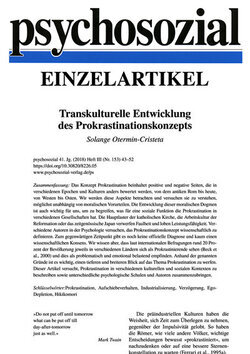Solange Otermin-Cristeta
Transkulturelle Entwicklung des Prokrastinationskonzepts (PDF)
Sofortdownload
Dies ist ein E-Book. Unsere E-Books sind mit einem personalisierten Wasserzeichen versehen,
jedoch frei von weiteren technischen Schutzmaßnahmen (»DRM«).
Erfahren Sie hier mehr zu den Datei-Formaten.
Das Konzept Prokrastination beinhaltet positive und negative Seiten, die in verschiedenen Epochen und Kulturen anders bewertet werden, von dem antiken Rom bis heute, von Westen bis Osten. Wir werden diese Aspekte betrachten und versuchen sie zu verstehen, möglichst unabhängig von moralischen Vorurteilen. Die Entwicklung dieser moralischen Dogmen ist auch wichtig für uns, um zu begreifen, was für eine soziale Funktion die Prokrastination in verschiedenen Gesellschaften hat. Die Hauptlaster der katholischen Kirche, die Arbeitskultur der Reformation oder das zeitgenössische Japan verwerfen Faulheit und loben Leistungsfähigkeit. Verschiedene Autoren in der Psychologie versuchen, das Prokrastinationskonzept wissenschaftlich zu definieren. Zum gegenwärtigen Zeitpunkt gibt es noch keine offizielle Diagnose und kaum einen wissenschaftlichen Konsens. Wir wissen aber, dass laut internationalen Befragungen rund 20 Prozent der Bevölkerung jeweils in verschiedenen Ländern sich als Prokrastinierende sehen (Beck et al., 2000) und dies als problematisch und emotional belastend empfinden. Anhand der genannten Gründe ist es wichtig, einen tieferen und breiteren Blick auf das Thema Prokrastination zu werfen. Dieser Artikel versucht, Prokrastination in verschiedenen kulturellen und sozialen Kontexten zu beschreiben sowie unterschiedliche psychologische Schulen und Autoren zusammenzubringen.
Abstract:
Procrastination as a concept contains positive and negative aspects, which are seen differently depending on various epochs or cultures, from ancient Rome until today, from west to east. The article addresses those aspects in order to understand them without judging based on morality. Nevertheless the development of moral dogmata is important for understanding the social function of procrastination in various societies. Idleness is seen as one of the most severe sins by catholic church and is discarded by the labour culture of protestantism or contemporary Japanese culture while productivity is praised. Various Psychologists try to give a scientific definition of procrastination, yet there is no official diagnosis and no consensus. According to international research about 20 percent ofthe population consider themselves as procrastinators (Beck et al., 2000) in a problematic and emotional stressful way. The article tries to shed a light on procrastination in various cultural and social contexts and tries to bring together various psychological schools and authors.
Abstract:
Procrastination as a concept contains positive and negative aspects, which are seen differently depending on various epochs or cultures, from ancient Rome until today, from west to east. The article addresses those aspects in order to understand them without judging based on morality. Nevertheless the development of moral dogmata is important for understanding the social function of procrastination in various societies. Idleness is seen as one of the most severe sins by catholic church and is discarded by the labour culture of protestantism or contemporary Japanese culture while productivity is praised. Various Psychologists try to give a scientific definition of procrastination, yet there is no official diagnosis and no consensus. According to international research about 20 percent ofthe population consider themselves as procrastinators (Beck et al., 2000) in a problematic and emotional stressful way. The article tries to shed a light on procrastination in various cultural and social contexts and tries to bring together various psychological schools and authors.
Christine Kirchhoff & Tom D. Uhlig S. 5–7Editorial (PDF)
Anja KaußS. 8–22Prokrastination und die Gunst der Stunde (PDF)
Irene LehmannS. 23–33Intermezzi (PDF)
Zeitformen des Aufschiebens bei Christoph Marthaler, Philippe Quesne und Heike LangsdorfFranz J. SchaudyS. 34–42Prokrastination - Präkrastination (PDF)
Eine unheilige AllianzSolange Otermin-CristetaS. 43–52Transkulturelle Entwicklung des Prokrastinationskonzepts (PDF)
Christine Kirchhoff, Carolin Schnackenberg & Tom D. Uhlig S. 53–69Morgen, morgen, nur nicht heute … (PDF)
Prokrastination aus individueller und gesellschaftlicher PerspektiveKurt Grünberg & Friedrich Markert S. 73–97Child Survivors in Deutschland (PDF)
Zur Tradierung des extremen Traumas durch Szenisches Erinnern der ShoahPatrick MayerS. 98–116Die Mitte der Nation (PDF)
»Extremismustheorien« und die Wahrnehmung von RassismusSimon Moses SchleimerS. 117–132Die Unmöglichkeit zu Trauern (PDF)
Eine psychosoziale Perspektive auf transnationale Migration und RemigrationStephan HauS. 133–134Rezension von: Sigmund Freud (2017). Briefe an Jeanne Lampl-de Groot 1921-1939 (PDF)
Anja KaußS. 8–22Prokrastination und die Gunst der Stunde (PDF)
Irene LehmannS. 23–33Intermezzi (PDF)
Zeitformen des Aufschiebens bei Christoph Marthaler, Philippe Quesne und Heike LangsdorfFranz J. SchaudyS. 34–42Prokrastination - Präkrastination (PDF)
Eine unheilige AllianzSolange Otermin-CristetaS. 43–52Transkulturelle Entwicklung des Prokrastinationskonzepts (PDF)
Christine Kirchhoff, Carolin Schnackenberg & Tom D. Uhlig S. 53–69Morgen, morgen, nur nicht heute … (PDF)
Prokrastination aus individueller und gesellschaftlicher PerspektiveKurt Grünberg & Friedrich Markert S. 73–97Child Survivors in Deutschland (PDF)
Zur Tradierung des extremen Traumas durch Szenisches Erinnern der ShoahPatrick MayerS. 98–116Die Mitte der Nation (PDF)
»Extremismustheorien« und die Wahrnehmung von RassismusSimon Moses SchleimerS. 117–132Die Unmöglichkeit zu Trauern (PDF)
Eine psychosoziale Perspektive auf transnationale Migration und RemigrationStephan HauS. 133–134Rezension von: Sigmund Freud (2017). Briefe an Jeanne Lampl-de Groot 1921-1939 (PDF)

